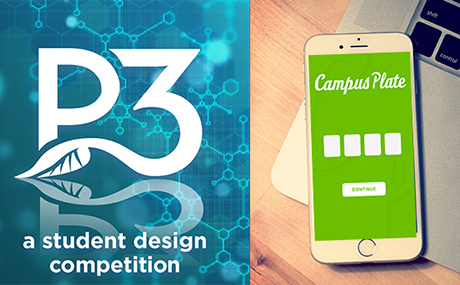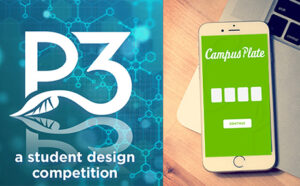
21 Jan Food Waste App by Baldwin Wallace to Receive EPA Grant Funding
The U.S. Environmental Protection Agency (EPA) is investing grant money in a Baldwin Wallace University project that aims to harness technology to reduce campus food waste and food insecurity.
 With funding from the EPA’s People, Prosperity and the Planet (P3) grant program, BW faculty-student collaborators in computer science and sustainability are aiming to design and deploy a smartphone app that will result in the recovery of 5-10% of all food at campus events and dining halls during the first year of use.
With funding from the EPA’s People, Prosperity and the Planet (P3) grant program, BW faculty-student collaborators in computer science and sustainability are aiming to design and deploy a smartphone app that will result in the recovery of 5-10% of all food at campus events and dining halls during the first year of use.
“Both food waste and food insecurity are significant issues on college campuses nationwide,” explains Dr. Franklin Lebo, assistant professor and co-director of sustainability. “This project uses an app and a peer-to-peer volunteer model to rapidly identify, recover and redirect unused food to students who can put it to good use.”
TRACKING AND REDIRECTING FOOD WASTE
In “normal” times, when large, in-person campus events are plentiful, so are the meals and refreshments served at those gatherings, often resulting in leftovers.
“Our goal is to develop an app, accessible via Android and iOS, that will keep track of that surplus food, which will be recovered and safely stored in refrigeration around campus by trained student volunteers,” says Dr. Brian Krupp, assistant professor of computer science.
Krupp says the idea to create the “Campus Plate” app to redirect surplus food waste has been percolating at BW for more than a year, but the grant will accelerate completion of the project.
“We expect to begin testing the app with BW Veterans Services, Diversity Services and the Lou Higgins Recreation Center first,” Krupp explains. “After it’s made available to the student body as a whole, we anticipate the potential to license the app to other universities and/or restaurants.”
ADVANCING SCIENTIFIC KNOWLEDGE
“Advancements in scientific knowledge and technology come from innovative projects like these,” says EPA Regional Administrator Kurt Thiede.
The P3 design competition and grants are split into a two-part program. Phase I supports development of a “proof of concept.” In Phase II, teams are eligible to compete for an additional grant of up to $100,000 to implement their design in a real-world setting.
“The P3 program helps foster environmental education among students to support the next generation of scientists and engineers working to tackle some of today’s most pressing environmental issues,” adds Jennifer Orme-Zavaleta, EPA’s principal deputy assistant administrator for science.
BROAD CAMPUS COLLABORATION
Students gaining real-world experience as part of the BW P3 initiative include Dan Fitzgerald ’21, Terrell McDowell ’23, Dylan Johnson ’21 and Leighton Medved ’22 on the computer science side of the project, while Hastings Marek ’21 and Elizabeth Gifford ’23 are working on the sustainability side of the equation.
The project also enjoys the support and expertise of BW Dining Services and the Brain Center for Community Engagement.






